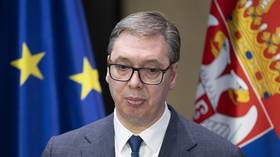The TV channel RT Balkan has begun broadcasting from Belgrade, presenting news, analysis, interviews and documentaries to Serbian-language audiences.
Friday’s on-air debut follows the launch of the RT Balkan multimedia portal in 2022. The website has since become a popular source of information for Serbian audiences.
“I congratulate the entire RT Serbian team and all our viewers on finally finding each other,” said RT Editor-in-Chief Margarita Simonyan. “We are incredibly happy that, despite all the sanctions, despite our voice being suppressed wherever possible, we will nevertheless broadcast here, in Serbia, in Europe.”
Simonyan wished the employees of RT Balkan “a lot of courage and perseverance,” which is required to work for RT in the climate of sanctions, censorship and pressure from the US and its allies.
“We are proud to work in the only country in Europe where freedom of speech still exists – something that’s fashionable to talk about in the West but not to practice,” said RT Balkan Editor-in-Chief Jelena Milincic. “We are very grateful to the politicians of Serbia and Russia who made this possible despite enormous pressure from Western countries trying to break the friendship between our peoples.”
According to Milincic, the channel has assembled a team of both young and experienced journalists who “refuse to submit to Western narrative hegemony.”
The new channel’s flagship show will be Relativizacija (‘Relativization’), hosted by Ljiljana Smajlovic, the former head of the Serbian Journalists’ Association. Friday evening’s inaugural special also featured a guest appearance by the internationally renowned film director Emir Kusturica.
The US and the EU have repeatedly pressured Serbia to prevent the launch of RT Balkan. The head of the US government’s Global Engagement Center, James Rubin, urged Belgrade to shut down the outlet in 2023. Brussels has likewise demanded Belgrade restrict Russian media broadcasts and “harmonize” with the EU’s sanctions policy towards Moscow.
Serbia has declared neutrality in the Russia-Ukraine conflict and refused to follow the NATO and the EU in sanctioning Moscow.

 18 hours ago
3
18 hours ago
3











 English (US) ·
English (US) ·